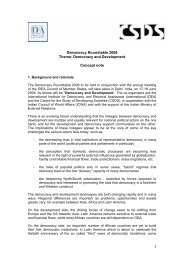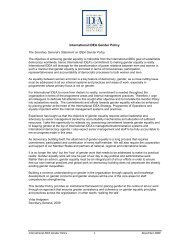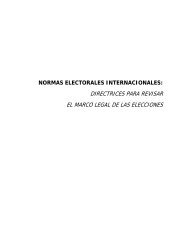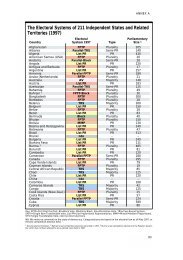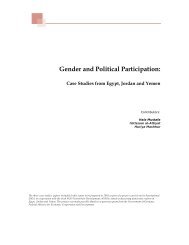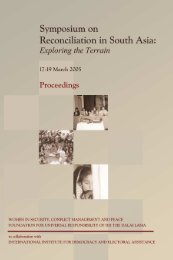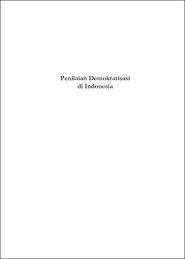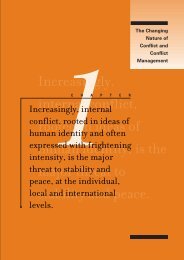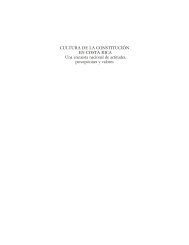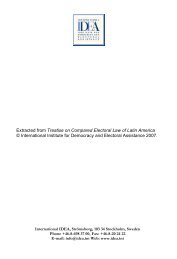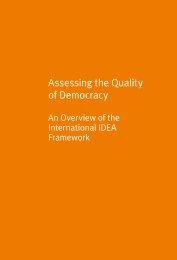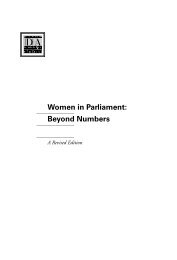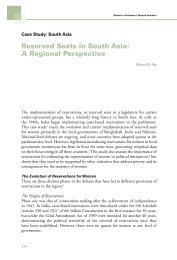The Role of State Constitutions in Protecting ... - International IDEA
The Role of State Constitutions in Protecting ... - International IDEA
The Role of State Constitutions in Protecting ... - International IDEA
Create successful ePaper yourself
Turn your PDF publications into a flip-book with our unique Google optimized e-Paper software.
All m<strong>in</strong>orities, whether based on religion or language, shall have the fundamental<br />
right to establish and adm<strong>in</strong>ister education <strong>in</strong>stitutions <strong>of</strong> their choice [Art.<br />
30(1)]. While Art. 29(1) enables them to run their own educational <strong>in</strong>stitution,<br />
so that the <strong>State</strong> cannot compel them to attend any other <strong>in</strong>stitutions, not to their<br />
lik<strong>in</strong>g. By the 1978 amendment, favorable treatment has been accorded to such<br />
m<strong>in</strong>ority educational <strong>in</strong>stitutions <strong>in</strong> the matter <strong>of</strong> compensation for compulsory<br />
acquisition <strong>of</strong> property by the <strong>State</strong>. By reason <strong>of</strong> the appeal <strong>of</strong> Art. 31, all persons<br />
have lost their constitutional right to compensation for acquisition <strong>of</strong> their<br />
property by the <strong>State</strong>. However, educational <strong>in</strong>stitutions established by a m<strong>in</strong>ority<br />
community lie entrenched <strong>in</strong> this behalf. <strong>The</strong>ir property cannot be acquired by<br />
the state without payment <strong>of</strong> such compensation as would safeguard their right to<br />
exist, as is guaranteed by Art. 30 (1A).<br />
<strong>The</strong> <strong>State</strong> shall not, discrim<strong>in</strong>ate <strong>in</strong> grant<strong>in</strong>g aid to educational <strong>in</strong>stitutions on the<br />
ground that it is under the management <strong>of</strong> a m<strong>in</strong>ority, whether based on religion<br />
or language [Art. 30 (2)].<br />
<strong>The</strong> ambit <strong>of</strong> the above educational safeguards <strong>of</strong> all m<strong>in</strong>ority communities,<br />
whether religious, l<strong>in</strong>guistic, or otherwise, can be understood only if we notice the<br />
propositions evolved by the Supreme Court <strong>of</strong> the above guarantees:<br />
(a) Every m<strong>in</strong>ority community has the right not only to establish its own<br />
educational <strong>in</strong>stitutions, but also to impart <strong>in</strong>struction to the children <strong>of</strong><br />
its own community <strong>in</strong> its own language.<br />
(b) Even though H<strong>in</strong>di is the national language <strong>of</strong> India and Art. 351<br />
provides a special directive upon the <strong>State</strong> to promote the spread <strong>of</strong><br />
H<strong>in</strong>di, nevertheless, the object cannot be achieved by any means, which<br />
contravenes the rights guaranteed by Art. 29 0r 30.<br />
(c) In mak<strong>in</strong>g primary education compulsory [Art. 45], the <strong>State</strong> cannot<br />
compel that such education must take place only <strong>in</strong> the schools owned,<br />
aided or recognized by the <strong>State</strong> so as to defeat the guarantee that a<br />
person belong<strong>in</strong>g to a l<strong>in</strong>guistic m<strong>in</strong>ority has the right to attend<br />
<strong>in</strong>stitutions run by the community, to the exclusion <strong>of</strong> any other school.<br />
(d) Even though there is no constitutional right to receive <strong>State</strong> aid, if the<br />
<strong>State</strong> does <strong>in</strong> fact grant aid to educational <strong>in</strong>stitutions, it cannot impose<br />
such conditions upon the right to receive such aid as would virtually<br />
deprive the members <strong>of</strong> a religious or l<strong>in</strong>guistic community <strong>of</strong> their right<br />
under Art. 30 (1). While the <strong>State</strong> has the right to impose reasonable<br />
conditions, it cannot impose such conditions as will substantially deprive<br />
the m<strong>in</strong>ority community <strong>of</strong> its rights guaranteed by Art. 30 (1).<br />
Surrender <strong>of</strong> fundamental rights cannot be exacted as the price <strong>of</strong> aid<br />
doled out by the state. Thus, the <strong>State</strong> cannot prescribe that if an<br />
<strong>in</strong>stitution, <strong>in</strong>clud<strong>in</strong>g one entitled to the protection <strong>of</strong> Art. 30 (1), seek<br />
to receive state aid, it must subject itself to the condition that the <strong>State</strong><br />
may take over the management <strong>of</strong> the <strong>in</strong>stitution or to acquire it on its<br />
subjective satisfaction as <strong>of</strong> certa<strong>in</strong> matters, – for such condition would<br />
completely destroy the right <strong>of</strong> the community to adm<strong>in</strong>ister the<br />
<strong>in</strong>stitution.<br />
25



